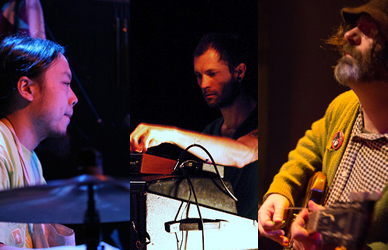
2013/12/05 木曜日木曜日
di Domenico O'Rourke Yamamoto Trioディ・ドメニコ・オルーク・山本 トリオ
Open: 19:30:00 | Start: 20:00 - 23:59
カテゴリーはないようです
- Export:
- iCal

予約する/Reserve
ライブ:ジョバンニ・ディ・ドメニコ(piano, rhodes)ジム・オルーク(guitar)山本達久(drums)
ローマ出身のGiovanni Di Domenicoは常に旅をしながら音楽を演奏してきた。Arve Henriksen、坂田明やJim O’Rourkeなどを始めとして様々なジャンル(モダンジャズ、即興、エクスペリメンタルポップ)の音楽に関わってきた。来日の度に素晴らしい音楽を届けてくれる「ジョヴァンニ・ディ・ドメニコ」今回も極上の音楽が期待出来る。
出演者詳細:
ジョヴァンニ・ディ・ドメニコ

Giovanni Di Domenico, pianist, performer, composer, was born in Rome on the 20th July 1977, a significantly tempestuous period in socio-political terms, featuring hostile polarizations and an ostensive paramilitarism, mutinous ideological confrontations and bloody terrorist attacks, rendered infamous in the description ‘Years of Lead’. In that particularly caustic summer, the so-called ‘Movement of 1977’, non-aligned, without any ties to the Parliament and non-violent, broke into the scene of prevalent conspiracy-steeped paranoia condemning the repressive, discriminatory and authoritarian tendencies of the Italian State and demanding equality for minorities and further civil rights. The coinciding liberalization of the media market, putting an end to RAI’s monopoly, further defined this period as the prime moment for pirate radio, with the consequence of a libertarian fragmentation of youth culture, epitomised by punk.
One could argue that Giovanni, self-taught until the age of 24, inherited – in philosophy, politics and artistically – the most benign and affirmative traits of that period, diversifying his action in the context of a recently unified Europe, promoting improbable connections, exploring varied geographies, comfortably manoeuvring aesthetical fringes and making a commitment to live performance at its most liberating and engaging. Surprisingly, the path that lead him to that point had an unexpected detour: following his father’s consecutive assignments as a civil engineer he actually lived out his first decade in Africa – until he was five in Libya, from then until his eight anniversary in the Cameroons and until ten in Algeria. His far off native country was not synonymous with civil unrest as much as with opera, whose arias he would memorize with his siblings in order to practice the language and provide some family entertainment. The condition of expatriate had a strong influence in his education – he clearly remembers the calls of the muezzin, the sound of exotic musical instruments in local markets, the ritualistic expression music took in the streets of Yaoundé, or the songs he heard from his nanny in the Cameroons.
When he finally enrolled in music school – majoring in ‘jazz piano’- he further built on an encyclopaedic technique; rhythm, harmony and tone are informed by non-western traditions yet equally sensitive to Debussy’s “Préludes”, Luciano Berio’s “Sequenzas”, to the ‘ambi-ideation’ heard in Borah Bergman’s Soul Note recordings, Cecil Taylor’s polissemic density, Paul Bley’s bruised transparency and of course, the most radical manifestations stemming from the underworld of pop music, invariably tied together by his own original praxis. A distinction – one would call it generational – he shares with many of the musicians he has crossed paths with recently, of which we could enumerate Nate Wooley, Chris Corsano, Arve Henriksen, Jim O’Rourke, Akira Sakata, Alexandra Grimal, Tetuzi Akiyama, João Lobo or Toshimaru Nakamura. Di Domenico has founded his own label, Silent Water, home of an eclectic and occasionally unclassifiable production. He lives in Brussels.
[Giovanni di Domenico official ](http://giovannididomenico.com/)
ジム・オルーク

1969年シカゴ生まれ。Derek Baileyの音楽と出会い、13才のジム少年はロンドンにBaileyを訪ねる。ギターの即興演奏に開眼し実験的要素の強い作品を発表、John Faheyの作品をプロデュースする一方でGastr Del SolやLoose Furなど地元シカゴのバンドやプロジェクトに参加、「シカゴ音響系」と呼ばれるカテゴリーを確立する。一方で、小杉武久と共に Merce Cunningham舞踏団の音楽を担当、Tony Conrad、Arnold Dreyblatt、Christian Wolffなどの作曲家との仕事で現代音楽とポストロックの橋渡しをする。1998年超現代的アメリカーナの系譜から『Bad Timing』、1999年、フォークやミニマル音楽などをミックスしたソロ・アルバム『Eureka』を発表、大きく注目される。1999年から2005年にかけてSonic Youthのメンバー、音楽監督として活動し、広範な支持を得る。2004年には、Wilcoの『A Ghost Is Born』のプロデューサーとしてグラミー賞を受賞、現代アメリカ音楽シーンを代表するクリエーターとして高く評価され、ヨーロッパでも数々のアーティストをプロデュースする。また、日本文化への造詣が深く、近年は東京に活動拠点を置く。日本でのプロデュース・ワークとしては、くるり、カヒミ・カリィ、石橋英子など多数。坂田明、大友良英、山本精一、ボアダムスなどとの共同作業や、武満徹作品『コロナ東京リアリゼーション』(2006)など現代音楽に至る多彩な作品をリリースしている。映像作家とのコラボレーションとしてWerner Herzog、Olivier Assayas、青山真治、若松考二などの監督作品のサウンドトラックを担当。ジム自身も映画監督として活動しており、彼の作品は、2004年と2006年にはホイットニー・ビエンナーレ、2005年にはロッテルダム映画祭で「重要作品」として上映されている。ソロとしての最近作『The Visitor』(2009)は『Bad Timing』の現代版と言える密室的ワンマン・アルバムの極致と言える。新しい「知」の探求者としてオルタナティヴ、ポストロック、エクスペリメンタル・ポップ、映画音楽、フリー・ミュージック、ジャズ、アメリカーナ、現代音楽など様々なジャンルの極北を切り開く越境的活動を行ない「現代東京カルチャー」の先導者となりつつある。
山本達久

1982年生。純アコースティック非エレクトリックドラマー。2003年、一楽儀光(ドラびでお)とのツインドラムハードスカムコアバンド「香港男祭」でRUINS、ガロリンズと共に韓国ツアーを敢行。賞賛と叱責を同時に浴びる。時期を同じく、佐々木匡士、倉地久美夫トリオ(菊地成孔sax/山内桂sax)など、唯一無二の歌い手との共演を重ねる。その時期から、山本精一、内橋和久、知久寿焼(exたま)、灰野敬二などなど数々のミュージシャンと多数セッションを敢行。同時にZu(ITA)、Lightning Bolt(US)、triosk(AUS)、Hans Reichel(GEL)、Gianni Gebbia(ITA)、Roger Turner(UK)など、来日アーティストのTourサポート、他多数にわたるイベントのオーガナイズも山口bar印度洋でこなす。現在では、数々の即興セッションを主軸に、石橋英子とのduoや、ナスノミツル、井上経康とのzggzag!!!、勝井祐二、marronとのプラマイゼロ、田村夏樹、藤井郷子、Kelly Churkoとのカルテット、el-malo柚木隆一郎ソロ音源へのレコーディング、2008年度芥川賞作家であり、歌手でもある川上未映子BANDへの参加、最近では成田宗弘(HIGHRISE)、田畑満(ZENI-GEVA/AMT & TCI)とのGreenFlames、町田良夫steelpanとのユニット「オハナミ」、大友良英、Jim O’roukeと共にカヒミ・カリィ・バンドでの録音や、AxSxE率いるNATSUMENのメンバーでもある等、数々のプロジェクトに参加、企画し、都内を中心に活動。
More great eventsこちらもどうですか
このカテゴリーにはまだないみたい / No events in this category